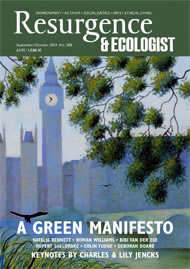Humanity, our fellow creatures, and civilisation itself are in a terrible mess – and the reasons lie not with human nature, or with other creatures, or with the fabric of the globe, but with strategies and policies framed and enacted by us. The trouble begins with the ways that people interact with other people, and nations with nations; the way we treat other species; the way we farm and mine and build and generally treat the world as a cornucopia, and as a place to camp. But we cannot put the world to rights ad hoc: a tax-break here, a little bit of greening there. The present problems have deep conceptual roots. To put things right we need to dig deep, through layer after layer of policy and then of preconception and of attitude, to the basements of our minds.
For beneath the day-to-day practicalities lie an economy and a system of governance that require us to behave the way we do. In particular we have been dominated these past three decades by the economic theory of neoliberalism – which compels each of us everywhere to compete with everyone else, worldwide; and the goal of that competition is simply to acquire more and more material wealth than the rest. This is now the rhetoric of all Britain’s ‘major’ political parties. In his end-of-year address to the nation in 2012 David Cameron didn’t just say “be nice to each other”, but warned that we must now prepare to do battle with the latest kid on the economic block, which, he told us, is Indonesia. What we are supposed to be competing for is wealth – measurable money. For all successful politicians now agree that we must strive above all for economic growth, where ‘growth’ means increase in gross domestic product (GDP) – although GDP, on inspection, proves to be a very flaky concept, primarily an exercise in creative accountancy.
So we must dig deeper still – and ask why we allow ourselves to be ruled by politicians who are obsessed by competition, which implies perpetual strife; and why we accept the dogma of growth when the all-out drive for wealth can be so damaging. The answer lies first in science – or rather in a part of science that has been misconstrued and misapplied. For neoliberalism is underpinned by the very particular idea of neo-Darwinism. This in turn is rooted in Tennyson’s notion of “Nature, red in tooth and claw”, which Charles Darwin expressed as “the struggle for existence” – which led in turn to the idea that Herbert Spencer summarised as “the survival of the fittest”. Competition, as it has been construed, is just the way of the world; but as a result of it, creatures including us humans become more finely tuned. In effect, the perpetual struggle is necessary. Without it, there could be no improvement.
More broadly, science in its present form reinforces out-and-out materialism: the idea that the world is just stuff. This is terribly sad. For science in its early days was perceived as a search for God’s purpose, an expression of reverence. Science too (in its present form) seems to many to promise omniscience, and the high tech that comes from science has led the powers that be to a sense of omnipotence. Hence, among other things, the present belief among genetic engineers that they can redesign living creatures to suit whatever the market may demand, an ambition that at least is ludicrous. As things are, science itself needs to be rescued.
The deep reasons for our present plight lie also in the decline of moral philosophy – seen no longer as a search for virtue but simply to be ‘utilitarian’: whatever makes people ‘happy’ in the short term is deemed to be good. In the neoliberal world the market itself decides what’s good or bad – and what is good is whatever people will pay for. There is still the odd taboo, thank goodness. Child pornography is condemned even though it is profitable. But guns are defended in the US largely because market forces suggest that guns are what people want, and they make a lot of people rich, and how else should worthiness be judged? In contrast, the moral principles that all religions agree upon are those of compassion and humility – but you won’t hear such words in present-day politics.
Still, though, we must dig deeper – down to what is properly called ‘metaphysics’, which, says the Islamic scholar Seyyed Hossein Nasr, has gone missing altogether from the secular Western world. For, says Nasr, metaphysics asks “the ultimate questions” that in common discourse are no longer addressed: what is the universe really like? what is good really? and how do we know what’s true? Our answers to these questions define our attitude to life – to other people, to other creatures, and to the Earth itself. Attitude is all. Neoliberalism and crude science (not science as it ought to be) require us to treat each other as potential enemies and the Earth as a resource. But life doesn’t have to be like that.
The immediate question for all of us is what to do about it. The general answer is to stop relying on the powers that be – government, commerce, big finance, and their attendant intellectuals and experts – and take matters into our own hands; rebuild the world on principles of common sense and compassion. We can’t achieve this simply by reforming the powers that be, for they can never change enough to do what’s needed. All-out revolution is too dangerous. Renaissance is the way ahead: we have to start doing things differently.
Renaissance is possible. Serendipitously, the easiest place to start is the most important: with food and agriculture.







